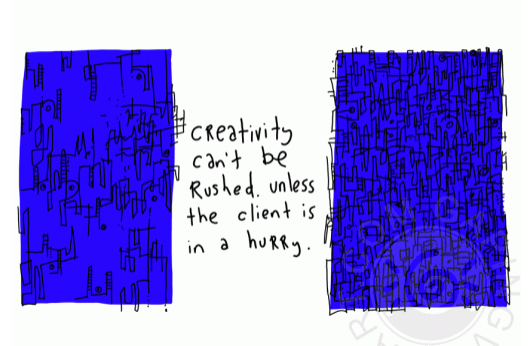 If I asked you to describe a “typical creative,” what would you say? Quirky? Unstructured? Eccentric? Challenging? Artistic? Dramatic? Wacky? ADD? The responses are widely varied based on who you ask, but at the core creatives are just people. They’re not magical unicorns or prize possessions to be paraded around for show. They’re people who bring a highly visible, highly valuable set of talents to their team.
If I asked you to describe a “typical creative,” what would you say? Quirky? Unstructured? Eccentric? Challenging? Artistic? Dramatic? Wacky? ADD? The responses are widely varied based on who you ask, but at the core creatives are just people. They’re not magical unicorns or prize possessions to be paraded around for show. They’re people who bring a highly visible, highly valuable set of talents to their team.
Realizing this, I often find myself wondering why we, as an industry, tend to hold creatives to a very different set of standards than the other members of a team. I am a creative and I'm guilty of it, too. The art of the creative has become so befuddling and esoteric, in fact, we now have websites devoted to advising others how to coexist with the mystical creative beast.
Somewhere along the way it seems a strange perception has become widely accepted about what defines the nature of a creative. If you work in the industry, you know what I’m talking about. The world, for reasons I’m not even sure it understands, bends to creative people, bowing to the perceived mystical genius. When creatives miss a deadline, excuses are made on their behalf. When they’re late to a meeting, everyone shakes their head and laughs it off as a side effect of that rascally creative DNA. The more people accept the stereotype of the creative as irresponsible, obstinate wild cards, the more the creative individual (and the true potential of their talent) becomes lost behind a human shield.
But is this really how creative genius evolves into great work? I say no. Much like laissez-faire parenting does little more than produce spoiled children, lack of clearly outlined expectations, lack of structure and lack of consequence is a system that fails everyone. The client. The agency. The team. The work. The creative themselves.
I read an awesome post by author Augusten Burroughs yesterday, and in true Augusten Burroughs-style, he put it oh-so-well:
Oh, how we hate limits. Limits hold you back. They confine you. They prevent you from doing what you want to do. Limits stop you from living a life without limits. Of course, this is only an illusion. What limits really do is give you an acceptable excuse to avoid doing something.
Limits are actually opportunities. The truth about not having everything you need, not being fully equipped, qualified, or allowed is that these limits are the nebula of creative genius. It requires a measure of innovation to accomplish something when there are limits blocking the way: a lack of skill, a lack of knowledge, a lack of funds, a limited set of tools. To circumvent the limits, you must create a novel solution or find an alternate route.
Limits force you to make the best of things. And “making the best” of something is a creative act.
Limits force improvisation. Improvisation creates new things.
When you have total freedom--no limits at all--you stop trying to make the best of things. This is the problem with “having it all": there is nothing left to want.
So to all of you out there reading this post as you desperately try to figure out How to Work With Creative People, take it from someone on the inside. We know how to meet deadlines. Hold us to them. If we're late for a meeting once, forgive us. If it happens again, pull us aside. Three times? Time for a little good ol' fashioned public shaming. If one of us tries to tell you "creativity can't be scheduled" (or if we try to feed you any other array of bullshit-y, excuse making lines), feel free to remind us that creativity may not work on a timeline, but our clients do.
The work will be better for it. And so will we.